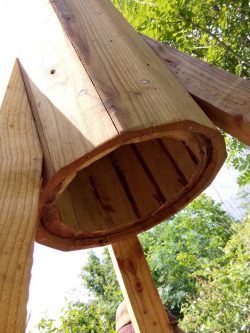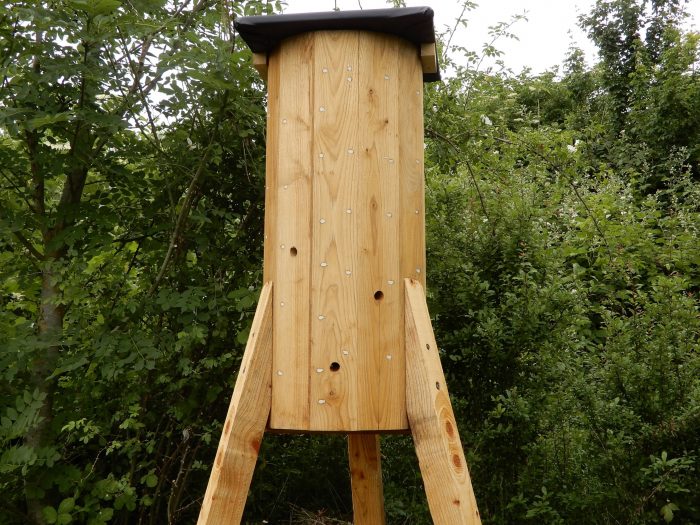
Home » Bee Box
Singleton Environment Centre is hosting a wild bee box from the “Bee-leeving” project. This is re-wilding and concentrates on the welfare of the bees rather than the commercial aspect of bee-keeping.
Our box is positioned on wooden legs but they can be sited in trees. It does not require much maintenance, or other human interference, and the honey they produce is left for the bees over the winter period. The box will act like a bird or bat box to provide a much needed home for a bee colony. The modern approach to tree management means that any trees that are rotting and would naturally have provided a home for bees are now mostly cut down.

The Singleton Environment Centre is all about conservation of our native species, so wild bees in their natural habitat are more in keeping with our ethos. The bees will be observed for educational purposes and are a great addition to the Centre’s activities.
The box, shown being delivered in the top photo, is about 1m x 450mm with 50mm thick walls, has twelve sides with a fixed top and removable base (see photo without base fitted). It is constructed from Sweet Chestnut that is locally sourced. The bee box will be monitored to make sure the bees are happy and disease-free. The data collected will be used to help support others to create similar projects.
The box is “baited” with brood comb (where the queen lays her eggs) propolis, which the bees produce naturally, and lemon grass oil. These are all highly scented and are attractive to the bees. This encourages them to use the box in the belief that another colony has used it before and it is therefore a safe place for them to “bee”
The project purpose is to help create bee colonies that live freely and untreated by chemicals in and around Kent.

Bee Box mimics an old tree trunk
Commercial bee-hives are constructed to make things easier for the bee-keeper, but the bee boxes are designed around the activity, welfare and needs of the bees.
In a commercial hive the bees are constantly disturbed and their honey is taken away and they are provided with sugar water instead. This is likened to taking away a natural organic diet and replacing it with a “McDonalds”. This approach is thought to have been one of the factors that has contributed to the “colony collapse” of many hives.
Although it would be good to have our “own” honey for sale we would rather allow the bees to keep the fruits of their labours. A hive at ground level could cause health and safety issues, particularly as many children visit the site.
Also many commercial hives are made up of colonies of foreign, imported bees. These are not as resistant to disease as the local Kentish bees and could introduce problems to the wild bee colonies.
In our bee box the bees are just allowed to be bees.
Singleton Spaces is pleased to have received a grant from Great Chart with Singleton Parish Council for the Bee Box.
The Bee-leeving project is run by Phil and Lynne Cowley Jones of Tenterden.
https://www.gofundme.com/bee-leeving
Phil and Lynne run workshops and talks so watch our event page.
For further information on re-wilding bees see
Natural Beekeeping Trust https://www.naturalbeekeepingtrust.org/
Bee Kind Hives – sustainable beekeeping https://beekindhives.uk/
“We encourage attention to the real nature of bees, their nesting preferences, their forage needs and their all-encompassing purpose.
We hope to inspire people to live in peace with the bees, be good hosts to them, guard them and grow for them, in all ways imaginable.”